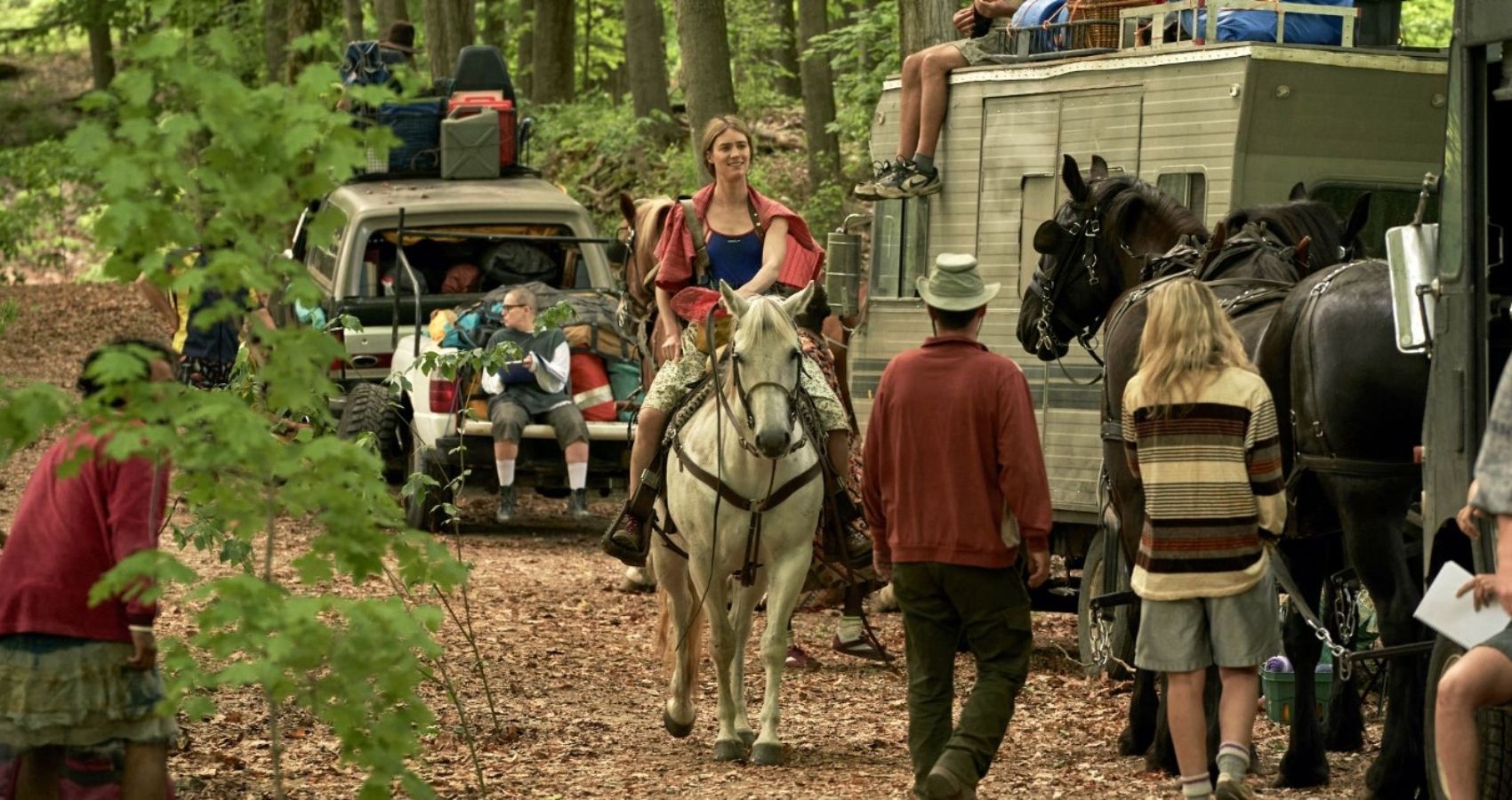Emily St. John Mandel’s 2014 novel Station Eleven is one of the latest in HBO’s lineup of adaptations for their streaming service, and it's made some changes to the story. While HBO series based upon books have taken creative liberties with the source material before, it hasn’t always been received well by fans (just look at Game of Thrones). However, the changes made to Station Eleven are far more intelligent and work in the adaptation’s favor, especially since it deals with the touchy subject of humanity being wiped out by disease.
The novel Station Eleven follows the past and present of multiple people as they struggle with the aftereffects of the Georgia Flu. This virus wipes out huge swathes of the human population. One character navigating the apocalypse among many, Kirsten, belongs to the Traveling Symphony, a caravan of performers who cross the Great Lakes region of North America and put on Shakespearean plays for scattered settlements. Through her history with Station Eleven's in-universe comic book, Kirsten connects in unexpected ways to people around her. We are taken on a journey detailing how art and sentimentality can link the human experience.
The Original Station Eleven Story
Station Eleven’s post-outbreak world is a dangerous one. Although groups have come together to create new communities, suspicion is rife, especially toward strangers. The characters we meet are friendly one second and violent the next. It’s a trope typical of stories telling the breakdown of human civilization, a balancing act between our basic survival instincts and our continued urge to create for creation’s sake. Humans can become dangerous creatures if need be, but as long as we keep hold of art, of our love for stories and entertainment, can we still be likened to beasts as a whole?
While the show keeps many similar themes and still delves into characters’ violence and paranoia, it also makes some vital changes that book readers might generally turn their noses up at. If an adaptation of a novel isn’t willing to follow the themes and events of the book precisely or get as close as possible within a limited runtime, it isn’t worth it, right? Well, if an adaptation takes into consideration how society, politics, and culture have shifted over time since the source material’s release, it turns out changes can be extremely beneficial.
The Changes Made by HBO
HBO’s Station Eleven diverts in many ways from its source. Characters meet at different points, backstories are altered, and plotlines are added or dropped. One of the most important changes is the relationship between Kirsten (Mackenzie Davis and Matilda Lawler) and Jeevan (Himesh Patel). The two meet only briefly in the novel, with Jeevan helping a young Kirsten get home to her family after a disastrous performance of King Lear. After that, they never see one another again.
The show obviously takes a huge turn from that. Rather than leave Kirsten on her doorstep, Jeevan offers her to join him. They stock up on supplies, board themselves up in the apartment belonging to Jeevan’s brother, and try to wait things out. But as it tends to go for characters in these types of scenarios, plans change, and the two set out to find their own way in the world. Without spoiling things, they work together as a small team for a time before an unfortunate event splits them up, and Kirsten believes Jeevan has died. The audience is left to speculate until the truth comes out.
It’s a big jump from the novel’s plot. What makes this deviation matter most is how important it is to our real-world experiences with diseases, separation, and a desire for interconnectedness.
These Changes Work for Station Eleven
The Station Eleven novel was released in 2014, years before we knew what it would mean to be locked up in our homes, our everyday lives suddenly changed. While some people have made attempts at a return to pre-pandemic normalcy, the fact remains that things are different now, from public venues, to workplace habits, to the number of people seeking mental health services. Through it all, something we most likely saw the most change in was our personal relationships. Speaking to friends over the phone or waving hi to family members on a video call is fine for a while, but eventually, we want to be in the same physical spaces again.
Mandel appeared to understand this as she helped adapt her novel for the screen. On top of maintaining those themes of art enduring through the years, HBO’s adaptation places increased emphasis on relationships. Kirsten is terrified at the prospect of her friends leaving her, even for a short amount of time. Her dynamic with Jeevan, once a complete stranger who helped her feel safe in a time of uncertainty, is compelling. Even characters whose main purposes in the novel are antagonistic were reworked for HBO, so we can better explore their pasts and dynamics with the people around them. It reflects what audiences may feel they’ve lost or what they’ve found to be increasingly important: true social connections.
Following the onset of COVID, can we afford more stories like the original Station Eleven, where people are only filled with distrust of one another? Where seeing another person is an immediate sign of danger? Do we still want those types of stories? The writers of HBO’s Station Eleven didn’t seem to think so. While it may differ from the source material, it hits precisely the right emotional beats in many ways that matter more than faithful adaptations.



.jpeg)
